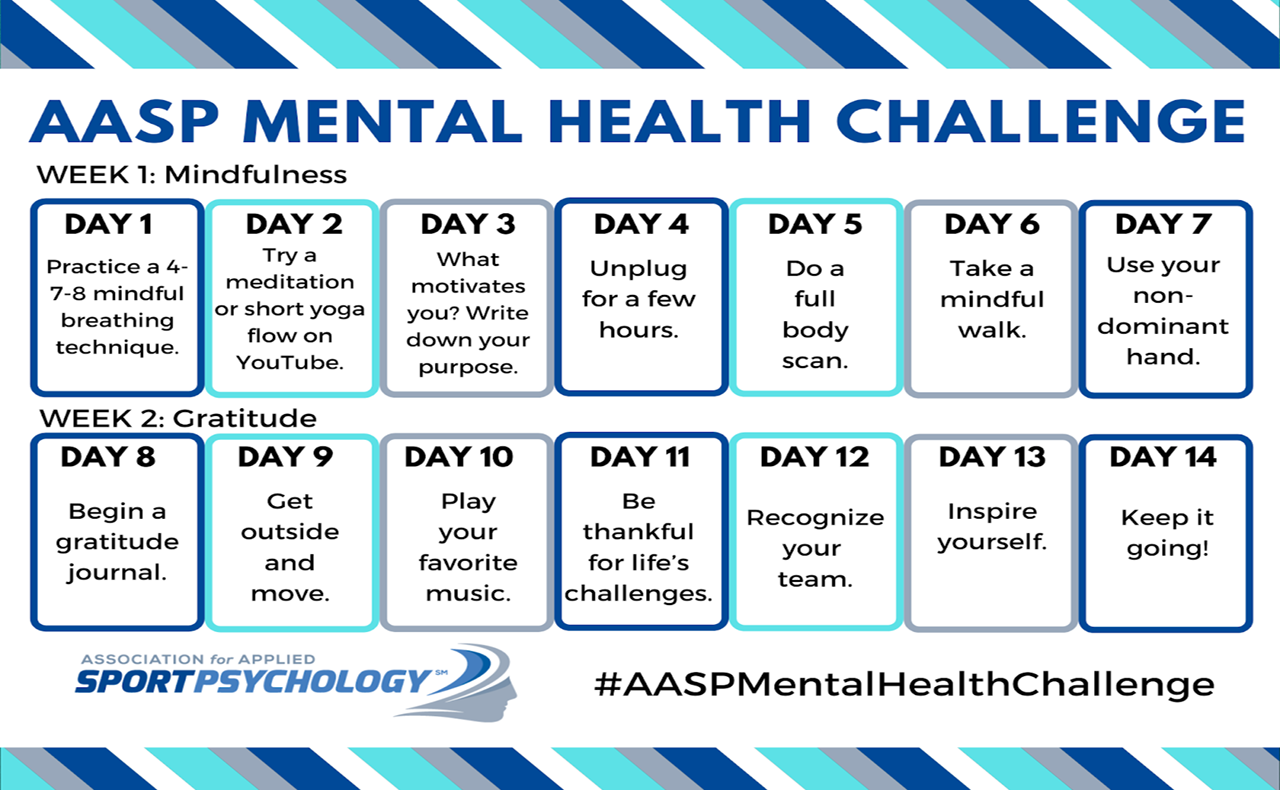AASP Mental Health Awareness Month Challenge

Published
In honor of Mental Health Awareness Month and as many seek support during the COVID-19 pandemic, join AASP for a two-week Mental Health Challenge!
With weekly themes focused on mindfulness and gratitude, AASP will share an activity daily and encourages you to participate and engage with the AASP community using the challenge hashtag #AASPMentalHealthChallenge.
The challenge begins Monday, May 18 and will run through Sunday, May 31. Review the full list of challenge activities below and be sure to follow AASP on Facebook and Twitter for daily challenge reminders and tips.
Week 1: Mindfulness
Day 1: Practice a 4-7-8 Mindful Breathing Technique.
Start by inhaling for 4 seconds, hold the breath for 7 seconds, and then exhale for 8 seconds. This breathing pattern forces the mind and body to focus on regulating the breath and aims to reduce anxiety.
The 4-7-8 breathing technique was developed by Dr. Andrew Weil and is based on an ancient yogic technique called pranayama, which helps practitioners gain control over their breathing Learn more about how and why this breathing technique works on Healthline.
Day 2: Try a Meditation or Short Yoga Flow on YouTube.
There are thousands of videos available online that can offer guidance to help you quickly relax and decompress by focusing on your breath and moving your body. Here are a few options to try:
- 5-Minute Meditation You Can Do Anywhere
- 7-Minute Meditation to Start Your Day
- Back To Basics Guided Meditation: For Beginners & Returning Meditation Users
- Gentle Yoga Flow - 30-Minute All Levels Yoga Class
- 10-Minute Morning Yoga Full Body Stretch
Day 3: What Motivates You?
Write down your purpose and post it near your workstation to serve as a reminder to help guide you during a workout or tough workday.
Day 4: Unplug for a Few Hours.
Turn off the phone, computer and TV for a few hours before bed. Your mind will start to wind down and you can focus on activities such as reading, stretching or meditating to prepare for a night of deep sleep.
Day 5: Do a Full Body Scan.
Take a moment to settle your body into a comfortable seated or reclined position. Begin by taking a full deep breath in and exhale through your nose. Bring your awareness to the top of your head, face, neck, shoulders. Notice any sensations, movements or places where you are physically holding on to stress. Next move down your arms to your hands, then down your legs from your thighs to your shins and feet. After completing your full body scan, take a few deep breaths. Here is a guided body scan meditation if you are seeking more direction.
Day 6: Take a Mindful Walk.
Get outside and before you start walking, take a moment and notice yourself standing. Feel your feet on the ground, straighten your posture, breathe deeply. Then look up and begin to take in your surroundings- what colors do you see? What sounds surround you? How does the air feel on your skin? What sensations do you feel in your body? Consciously begin walking and notice the physical sensation of your foot making contact with the ground.
Day 7: Use Your Non-Dominant Hand.
Try performing daily activities such as eating or brushing your teeth with your non-dominant hand. This will help you bring your attention to the movement and challenge your mind during a typically mundane activity.
Week 2: Gratitude
Day 8: Begin a Gratitude Journal.
At the end of each day, write down three things that made you feel happy or grateful. This can be in your phone, in a journal or in a gratitude journaling app.
Day 9: Get Outside and Move.
Take time to appreciate the outdoors and participate in your favorite physical activity today. Whether you take a walk around the neighborhood to admire nature or ride your bike to feel the wind against your face, take a moment to celebrate how moving your body helps you feel both physically and mentally.
Day 10: Play Your Favorite Music.
Take 15 minutes to blast your favorite tunes and either sit and enjoy in stillness or dance around the room to see how the music makes your mind and body feel.
Day 11: Be Thankful for Life’s Challenges.
Think about two things that have challenged you and what you have learned from working toward overcoming these challenges. Celebrate your progress and remember how far you’ve come in your journey.
Day 12: Recognize Your Team.
Who are three people you are grateful for? Take a few minutes today to give them a call or text, write a letter or email or reminisce on your favorite memories to celebrate those who support you.
Day 13: Inspire Yourself.
Gather quotes, graphics or photos that remind you to feel grateful and post them around your house or as your phone or computer wallpaper as a daily reminder.
Day 14: Keep It Going.
Make a plan for how you can continue to incorporate mindfulness and gratitude practices into your routine beyond this challenge. Will you continue a gratitude journal? Can you continue to reduce screen time before bed? Minor adjustments can make a huge impact on your mood and overall well-being.
Share this article:
Published in:




